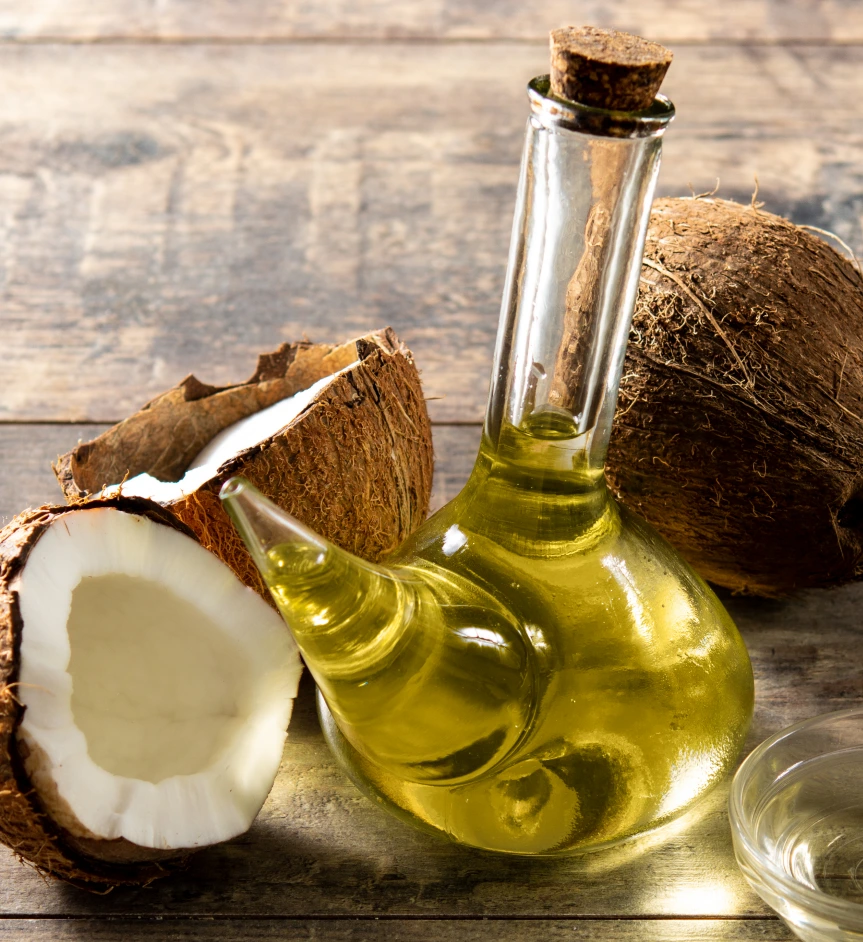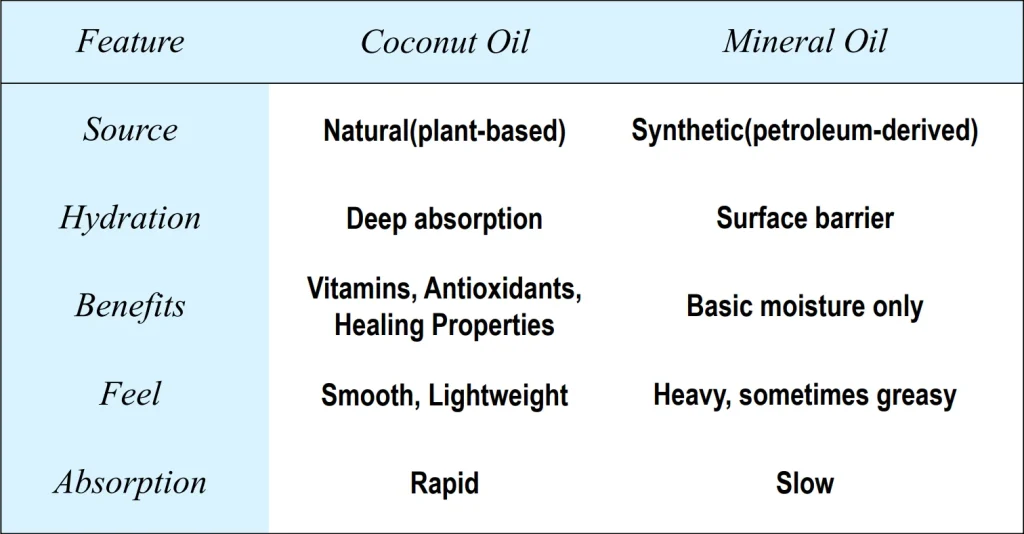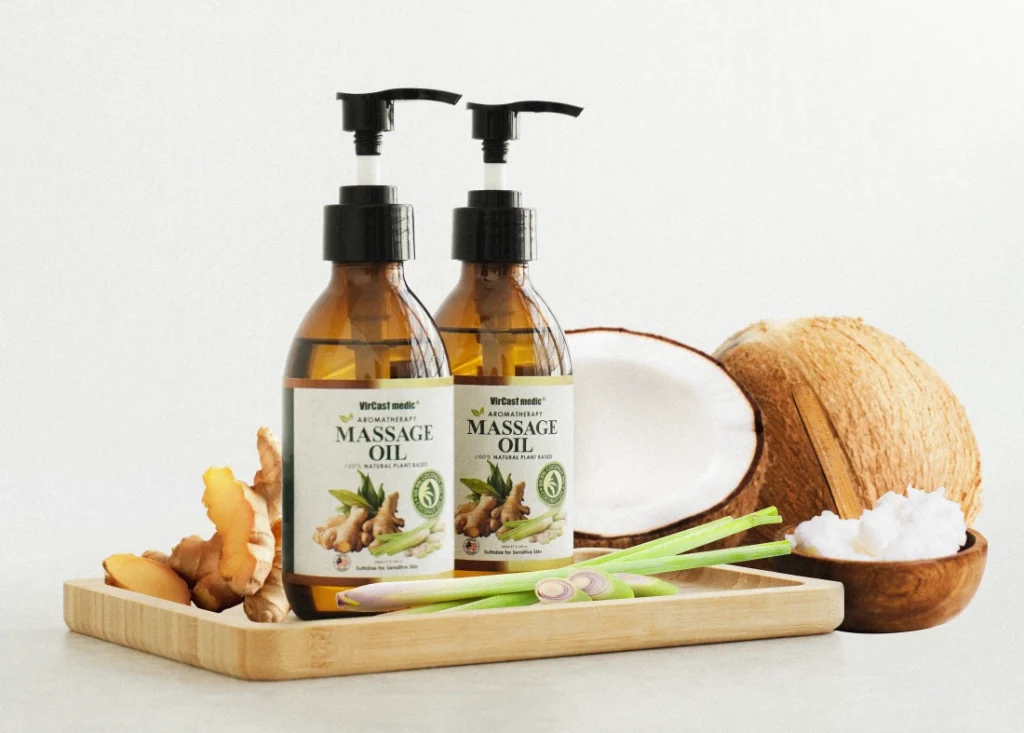Free shipping when purchase RM25 & above

Massage oils infused with natural ingredients are increasingly recognized for their therapeutic benefits in stress management, pain relief, and skin health. This article reviews the potential health benefits of coconut oil–based massage blends enriched with essential oils, summarizing evidence from current literature and highlighting their applications for relaxation, skin hydration, and antimicrobial protection.

Massage therapy is widely practiced as a complementary health approach for reducing stress, alleviating muscle tension, and improving general well-being (Field, 2016). The carrier oil used during massage plays a key role in both the effectiveness and the safety of treatment.
Coconut oil, in particular, has been identified as a favorable medium due to its moisturizing, anti-inflammatory, and antimicrobial properties (Varma et al., 2019). When combined with essential oils such as lavender or lemongrass, massage oils may provide additional physiological and psychological benefits.
Coconut oil is composed primarily of medium-chain fatty acids, such as lauric acid, which demonstrate antimicrobial activity against bacteria, fungi, and viruses (Ogbolu et al., 2007). Its light texture allows for easy absorption, reducing friction during massage while enhancing skin hydration (Evans & Lutz, 2020). These properties make it a preferred base oil in both traditional and modern aromatherapy practices.

Massage with coconut oil before bedtime may promote improved sleep quality by reducing muscular tension and stress levels. Lower stress facilitates faster sleep onset and contributes to a
more restorative rest cycle.
When combined with gentle massage techniques, warmed coconut oil promotes muscle relaxation and improves circulation. The infusion of essential oils such as lemongrass and ginger further enhances the experience, providing aromatherapeutic effects that help alleviate stress and induce mental calmness.
Coconut oil is an effective emollient, rich in natural lipids and medium-chain fatty acids. These components penetrate the skin’s barrier, providing deep hydration and improving texture. Regular application can alleviate dryness, flakiness, and loss of elasticity, resulting in a healthy and luminous appearance.
Naturally containing antioxidants such as vitamin E and polyphenols, coconut oil can help reduce oxidative stress and support skin repair. Its anti-inflammatory properties are beneficial for conditions like eczema, dermatitis, and mild skin irritation, while also potentially slowing signs of premature ageing.
Several randomized controlled trials have found that topical application of virgin coconut oil (VCO) significantly improves skin hydration and reduces symptoms of dryness in conditions like xerosis (dry skin), performing as effectively—and sometimes better—than mineral oil, with no adverse effects on water loss or skin pH.
Additionally, in patients with mild to moderate atopic dermatitis, VCO has been shown to reduce disease severity (SCORAD), decrease transepidermal water loss, and improve skin capacitance and barrier repair.

Coconut oil’s medium-chain fatty acid lauric acid (comprising about 50% of its fatty acid content) exhibits strong antimicrobial activity, particularly effective against strains of Staphylococcus aureus, E. coli, and Propionibacterium acnes—often outperforming benzoyl peroxide in vitro.
Broader reviews support coconut oil’s antioxidant, anti-inflammatory, antimicrobial, and wound-healing properties, making it a versatile agent in managing dermatologic conditions.
Evidence suggests that massage, combined with essential oils, can effectively reduce physiological stress markers. One study reported significant reductions in cortisol levels following simplified aroma hand massage.
Similarly, a longer-term aromatherapy trial showed decreases in salivary cortisol and blood pressure in participants exposed to essential-oil inhalation, highlighting aromatherapy’s potential to regulate stress responses.

Broader reviews confirm that essential oil inhalation and massage provide measurable emotional and physiological benefits, including reduced anxiety, improved sleep, and lowered stress.
Unlike mineral oil, which is petroleum-derived and primarily forms a barrier on the skin’s surface, coconut oil is plant-based and penetrates deeply to deliver nutrients directly to the skin. While both offer moisturising benefits, coconut oil provides additional vitamins, antioxidants, and bioactive compounds without a heavy, greasy residue.

The VirCast Medic Aromatherapy Massage Oil incorporates coconut oil with lemongrass and ginger essences, enhanced with vitamin E for added antioxidant support. It is formulated to be 100% natural, plant-derived, and suitable for sensitive skin.
The product’s safety and efficacy have been evaluated through collaborations with Malaysian universities, ensuring quality and consumer trust.


Massage oils formulated with coconut oil and essential oils represent a promising complementary therapy for improving health and well-being. Their combined moisturizing, antimicrobial, and relaxation-inducing effects make them valuable in both clinical and personal wellness settings.
Evans, M. & Lutz, R. (2020). Carrier oils in aromatherapy: A review of benefits and applications. Journal of Complementary Health, 18(2), 77–84.
Field, T. (2016). Massage therapy research review. Complementary Therapies in Clinical Practice, 24, 19–31.
Hedayat, K., Tsao, J., & Tilburt, J. (2019). Complementary and integrative medicine in pain management. Medical Clinics of North America, 103(1), 95–113.
Koulivand, P.H., Khaleghi Ghadiri, M., & Gorji, A. (2013). Lavender and the nervous system. Evidence-Based Complementary and Alternative Medicine, 2013, 681304.
Ogbolu, D.O., Oni, A.A., Daini, O.A., & Oloko, A.P. (2007). In vitro antimicrobial properties of coconut oil on Candida species in Ibadan, Nigeria. Journal of Medicinal Food, 10(2), 384–387.
Shah, G., Shri, R., Panchal, V., Sharma, N., Singh, B., & Mann, A.S. (2011). Scientific basis for the therapeutic use of Cymbopogon citratus, stapf (Lemongrass). Journal of Advanced Pharmaceutical Technology & Research, 2(1), 3–8.
Varma, S.R., Sivaprakasam, T.O., Arumugam, I., Dilip, N., Raghuraman, M., Pavan, K.B., & Rafiq, M. (2019). In vitro anti-inflammatory and skin protective properties of virgin coconut oil. Journal of Traditional and Complementary Medicine, 9(1), 5–14.